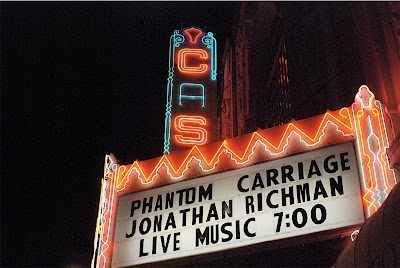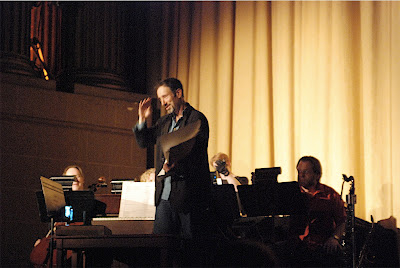
Last night I saw Jonathan Richman perform live accompaniment to the 1921 Swedish silent movie Phantom Carriage at the Castro Theatre.
I haven’t been to the Castro Theatre in a couple years and as I went in and saw the beautiful molding and ornamentation in the theater, I remembered how amazing that place is. There was an interesting mix of people milling around and finding their seats: Jonathan Richman fans, silent movie aficionados, indie movie people, etc.
If you’ve never seen a silent film with live musical accompaniment, I’d recommend it. It’s usually a pretty good experience. The semi-improvisational nature of the music adds a lot of excitement to the movie.

The movie itself is pretty complex for the time. The plot’s based around a Swedish folktale. The idea goes that the last to die in a year that has bad things has to spend the rest of the year being Death’s carriage driver. It employed a few techniques that I was surprised were employed then, including non-linear story telling and some fairly good special effects techniques for the ghosts.

On now onto the music. I’d seen Jonathan Richman before. He’s really quirky live and has a lot of charisma and stage presence, so I was really curious how it’d end up when these things were taken away. The set up was Jonathan on (nylon string) guitar and pump organ. Other players were two hand bell players, a trumpet/ baritone player, a bass clarinet/ saxophone/ flute player, a violinist and a cellist. I thought their accompaniment was really good and all the players were very talented. It worked really well with the movie. The main characters had motifs and there were parts were these two motifs were almost colliding when two characters were talking or arguing. A daring move was during certain particularly intense moments in the movie there they left it completely silent; I think it paid off.

View the full photo album.
Update: I’ve noticed the bad justification to the text next to the photos. I have tried to fix it, but it’s stubborn. Sorry!



